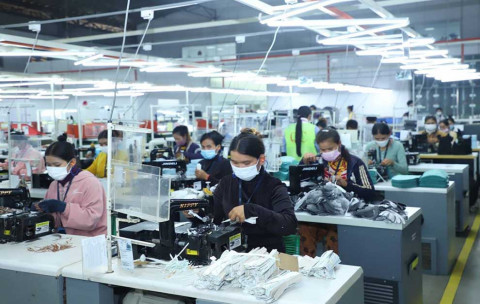
Representatives from 12 trade unions submitted proposals on fundamental rights and recommendations to the labour ministry for support on December 8. LABOUR MINISTRY
A senior official from the Ministry of Labour and Vocational Training expressed that a collective request for intervention from over 10 unions and civil society organisations (CSOs) was insufficiently clear for the ministry to address.
The body is open to resolving all issues that are presented with unambiguous information.
Ministry spokesperson Katta Orn stated on December 11 that the requests submitted on the occasion of Human Rights Day by various unions, associations and civil groups lacked specific details. The requests did not specify the locations, unions affected or the extent of issues related to discrimination, intimidation and curtailment of freedoms among association leaders and labour rights activists.
On December 8, representatives from 12 trade groups, including the Cambodian Alliance of Trade Unions (CATU), Federation of Building and Wood Workers (FBWW), Coalition of Cambodian Apparel Workers’ Democratic Union (CCAWDU), Center for Alliance of Labor and Human Rights (CENTRAL) and Cambodia Tourism Workers’ Union Federation (CTWUF), submitted proposals on fundamental rights and recommendations to the labour ministry for support.
“We have observed significant violations of these rights and freedoms, with serious attacks on independent unions and organisations in the field, particularly over the last three years,” the joint letter stated.
It accompanied documents from the relevant stakeholders, detailing challenges and recommendations. They included facilitating union registration, ending discrimination and intimidation of unions and ensuring adequate representation of diverse unions in the National Council on Minimum Wage (NCMW).
“The proposals don’t clearly state where these problems occurred, their current status or the specific unions involved. Are these merely preemptive requests for the … Human Rights Day report? Nonetheless, the ministry welcomes any case presented with clear information for resolution, benefiting both workers and employers under labour law,” Orn stated.
Contrary to the claims of some organisations, he emphasised that the state of labour rights in the country is harmonious, with both employers and workers understanding and respecting the law, despite occasional issues involving the suspension or termination of employment contracts.
He highlighted that, as of September this year, the country had over 17,000 factories, including more than 1,300 garment factories employing over 1.5 million workers and encompassing over 6,200 unions.
He added that there were 691 labour dispute cases, with 563 resolved by the ministry, 103 in progress, 25 annulled and 20 referred to the Arbitration Council.





















